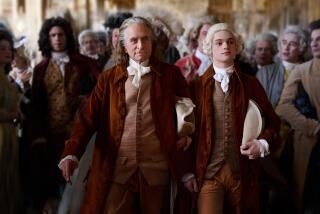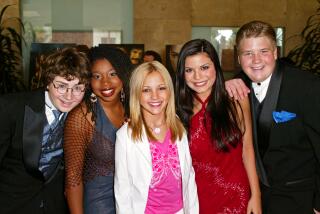Critic’s Notebook: Ears and eyes on Jon Benjamin
I think of Jon Benjamin as the voice of a generation, literally: He is less well known by sight than by his sound, a melodious deadpan that embodies the slightly irritable ironic tone of what are now at least a couple of generations of comedy. At 45, he is not quite an elder statesman, and yet, from his first public triumph, as Ben Katz on “Dr. Katz, Professional Therapist,” which premiered on Comedy Central in 1995, he seems to me undeniably an influence. Or perhaps I am just counting up all the times I have heard him since.
Benjamin, also credited as H. Jon Benjamin (his first name is Henry), has spoken the words for a variety of animated heroes that includes oversexed super-spy Sterling Archer on FX’s “Archer,” struggling small businessman Bob Belcher on Fox’s “Bob’s Burgers,” and a baseball glove on Adult Swim’s “Soul Quest Overdrive.” He has also played the devil in “Lucy, the Daughter of the Devil,” Coach McGuirk in “Home Movies” and a can of vegetables in the film “Wet Hot American Summer.” Unlike some voice actors, he is always recognizably himself; Benjamin is always Benjamin. What distinguishes Archer from Belcher, he said one recent morning in Hollywood, is “a tone change — it’s the difference between yelling and not yelling.”
He has not been completely invisible — he was, in human form, the other regular performer on Comedy Central’s “Important Things With Demetri Martin” — but now that network has given him his own show, “Jon Benjamin Has a Van,” which began its run Tuesday. With co-writer and featured player Leo Allen, he had come to the offices of Funny or Die, the Will Ferrell-Adam McKay comedy website site that co-produced the 10-episode series, to shoot promotional spots.
Originally framed as “a Sunday morning, Charles Kuralt-type show,” “Jon Benjamin Has a Van,” or “JBHV” as it’s abbreviated within the context of the show, began with a collection of “street pieces,” prankish roving-reporter spots he created for New York stage shows. (He has never really been a traveling comic, taking a routine on the road.)
“Comedy Central liked the really lo-fi idea of a show like that, and then we changed it radically,” he says. “When Leo and I got together and started writing, we realized that stringing together a bunch of those pieces would not be a great show, at least not to us, it would be little too one-note.” Inspired by a viewing of the movie “Thinner,” based on a Stephen King novel about a distracted driver who “hits a gypsy — in Maine” and is put under a curse, they thought, “Let’s write an episode where the show is cursed and just falls apart — we won’t have to do the formula we’re doing now. And after we wrote that one” — it will be the last episode in the series — “we were like, ‘Let’s do the whole show like this.’ We were excited, and we don’t get excited often.”
These grander, more complicated pieces, which thread through an episode and punch well above their budget, include a turf war between Little Italy and Little Little Italy, an elaborate miniature neighborhood in the back room of a delicatessen, and an investigation into a simulacrum city where rich men pay big money to live like derelicts. (When their sound man disappears with the microphone, the show loses its sound until his return.)
“JBHV” runs less on jokes than on conceptual puns and shifts in reality: Benjamin interviews a veteran with “pre-traumatic stress disorder.” As a helicopter is heard in the background, Benjamin observes, “That helicopter sound must not remind you of war, because you were never there.” Out on the street, he asks passersby if “they have a minute” and stands there silently, holding a microphone, for the duration. In a segment called “You Can’t Shoot Here,” he and his crew shoot in places they’re not supposed to until they’re told they can’t. In “Old People on the Internet,” he watches old people use the Internet.
Benjamin’s manner is indeed low-key — performing, his natural reserve lends an effective edge of hysteria to his louder moments — and it’s not surprising to learn that he backed into his career: “It was very ad hoc; I never intended on really doing it.” In the late 1980s, he roomed in Boston with Sam Seder (“The Majority Report,” “Pilot Season”), “who was trying to be a stand-up comedian and forced me to perform with him. I’m not sure if he enlisted me just because he was failing or it would have been more fun to have somebody else fail along with him. He would come up and tell his jokes and I would sit in the back in a chair reading a magazine, and I would do nothing.”
That nothing turned into something when Benjamin auditioned for “Dr. Katz.” Between in-character takes as Katz’s father and a “schlubby” friend, producer Loren Bouchard — subsequently the creator of “Home Movies,” “Lucy” and “Bob’s Burgers” — caught him on tape talking to then-girlfriend Laura Silverman (who would play Katz’s receptionist) and told them, “Do more of that.”
“It was the start of what he wanted out of the show, it really was just trying to have an authentic conversation.” And a voice was born.
More to Read
The complete guide to home viewing
Get Screen Gab for everything about the TV shows and streaming movies everyone’s talking about.
You may occasionally receive promotional content from the Los Angeles Times.







